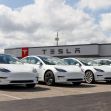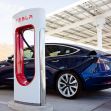Two different lawsuits were recently filed in a federal court in San Francisco alleging that electric car maker Tesla Inc.’s anti-repair policies are unlawfully anticompetitive. The lawsuits seek to hold Tesla liable to a nationwide class of customers who were forced to pay Tesla for repairs they could have conducted themselves or by using cheaper third-party parts.
According to the class action complaints, Tesla’s warranties, repair policies, and electric vehicles (EVs) are all designed to prevent customers from seeking repairs outside of Tesla repair facilities or from utilizing non-Tesla parts. The warranties, for example, warn that obtaining repairs from a non-Tesla shop could void coverage, while the vehicles themselves are designed such that “repairs require access to remote diagnostics and over-the-air software updates” available exclusively through Tesla or Tesla partners.
Traditionally, car owners “have had multiple options for maintaining and repairing their motor vehicles after purchase—they could perform the work themselves, bring their vehicle to a dealership, or bring them to an independent repair shop.” Customers seeking repairs also had the option of “using original equipment manufacturer (“OEM”) or aftermarket replacement parts.”
Not so for Tesla owners, who “effectively have only one option: schedule service at Tesla (or within the limited network of Tesla-approved service centers), where their Tesla will be maintained or repaired using only Tesla OEM parts.” As a result, customers not only “suffer lengthy delays in repairing or maintaining their EVs”; they also pay “supracompetitive prices for those parts and repairs.” According to the plaintiffs, customers cannot simply switch to another vehicle if they are dissatisfied with Tesla’s policies; EV customers are very unlikely to return to gas-powered vehicles, and Tesla dominates the EV market.
The lawsuits seek to undo Tesla’s “monopoly” on parts and repairs, including by forcing the company to make its repair manuals and diagnostic tools “available to individuals and independent repair shops at a reasonable cost.” Both complaints seek to certify a class covering anyone who has paid for a Tesla repair or auto part since March 2019.
Tesla is not the only vehicle manufacturer facing so-called “right to repair” claims. The right to repair movement has gained significant traction in recent years, in the automobile space and elsewhere. Last year, the Federal Trade Commission announced cases against motorcycle manufacturer Harley-Davidson Motor Company Group, grill maker Weber-Stephen Products, and MWE Investments, the manufacturer of Westinghouse outdoor power equipment. Harley-Davidson has also been hit with its own right-to-repair consumer class actions, as has farm equipment giant Deere & Co.
Automakers have grown wary of the possibility of different right-to-repair statutes arising in states around the country. Every motor vehicle manufacturer in the country, in fact, other than Tesla, entered into a Memorandum of Understanding (MOU) establishing a broad right to repair motor vehicles across the U.S.
The Tesla complaints argue that the MOU is inadequate to protect consumers, however, because it does not include “telematics,” meaning the “data transmitted wirelessly from the vehicle to the manufacturer.” Without such data, “independent repair shops are unable to effectively service today’s ‘connected’ vehicles.” Auto trade association and lobbyist group the Alliance for Automotive Innovation disputes this account, asserting the MOU does require automakers to share telematics. The organization touts itself as the “singular, authoritative and respected voice of the automotive industry.”
It’s not clear that existing legislation protects customers’ right to repair. The FTC and various class action plaintiffs aim to establish that antitrust and other current consumer protection laws protect the right to repair. More explicit right to repair laws, however, are thin on the ground. Without concrete action by state or federal legislatures, the right to repair may ride on the outcome of these lawsuits.






